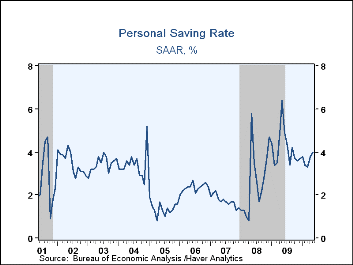 Global| Jun 28 2010
Global| Jun 28 2010U.S. Personal Income & Spending Firm While Pricing Improves
by:Tom Moeller
|in:Economy in Brief
Summary
Despite what was a disappointing May jobs number, personal income growth remained firm. May income rose 0.4% after an upwardly-revised 0.5% April gain. A 0.5% increase had been expected. Last month's increase reflected a stable 0.5% [...]
 Despite what was a disappointing May jobs number, personal income growth
remained firm. May income rose 0.4% after an upwardly-revised 0.5% April gain. A
0.5% increase had been expected. Last month's increase reflected a stable 0.5%
rise in wages & salaries which lifted the y/y increase to 0.7% after last
year's 4.1% decline. Reflecting improved productivity, factory sector wages
increased 1.8% y/y after the 11.1% decline during all of 2009. Service sector
wages also rose 0.7%, improved from last year's 4.0% drop but government wage
growth fell to 2.1% from 3.6%. Proprietors' income rose a greatly improved 5.9%
after last year's 5.9% drop while the decline in interest income moderated to
0.4%. Improved corporate profits led to an improved 3.2% rise in
dividends.
Despite what was a disappointing May jobs number, personal income growth
remained firm. May income rose 0.4% after an upwardly-revised 0.5% April gain. A
0.5% increase had been expected. Last month's increase reflected a stable 0.5%
rise in wages & salaries which lifted the y/y increase to 0.7% after last
year's 4.1% decline. Reflecting improved productivity, factory sector wages
increased 1.8% y/y after the 11.1% decline during all of 2009. Service sector
wages also rose 0.7%, improved from last year's 4.0% drop but government wage
growth fell to 2.1% from 3.6%. Proprietors' income rose a greatly improved 5.9%
after last year's 5.9% drop while the decline in interest income moderated to
0.4%. Improved corporate profits led to an improved 3.2% rise in
dividends.
Lower gasoline prices again held back the overall gain in spending. Nevertheless, personal consumption expenditures rose 0.2%. A 0.1% uptick had been expected. The 0.3% gain in real terms pulled the increase versus last year to 2.6%, its highest since before the recession began and up from moderate declines during the last two years. Spending on motor vehicles increased 2.2% (12.1% y/y). A 0.4% slip in furniture spending limited the 12-month increase here to 7.6% after sharp drops during the last two years. Apparel spending also fell during the last two months but the annual gain was a strong 4.6% after last year's 3.5% drop. Adjusted for lower prices the gain was 5.4% after declines during the last two years. Finally, spending on services grew 0.3% and the 1.3% y/y gain was up from last year's 0.1% uptick. Gains in food services and financial services accounts for the improvement.
The PCE chain price index slipped marginally both last month and during April with the drop in gasoline prices. The core PCE price deflator rose an improved 0.2%, the strongest gain since October. It owed to the first increase in apparel prices (-0.8% y/y) since January. Prices for furniture & appliance prices fell 4.4% y/y. Services prices also gained 0.2% (1.9% y/y) as health care prices rose 0.2% (2.5% y/y). Financial services prices also have strengthened by 3.9% y/y).
The personal savings rate inched up to 4.0%, its highest level since September.
The personal income & consumption figures are available in Haver's USECON and USNA databases.
| Disposition of Personal Income (%) | May | April | March | Y/Y | 2009 | 2008 | 2007 |
|---|---|---|---|---|---|---|---|
| Personal Income | 0.4 | 0.5 | 0.4 | 1.6 | -1.8 | 2.9 | 5.6 |
| Disposable Personal Income | 0.4 | 0.6 | 0.5 | 2.7 | 1.0 | 3.9 | 4.9 |
| Personal Consumption Expenditures | 0.2 | 0.0 | 0.6 | 4.6 | -0.4 | 3.1 | 5.4 |
| Saving Rate | 4.0 | 3.8 | 3.3 | 6.4 (May'09 |
4.2 | 2.6 | 1.7 |
| PCE Chain Price Index | -0.0 | 0.0 | 0.1 | 1.9 | 0.2 | 3.3 | 2.7 |
| Less food & energy | 0.2 | 0.1 | 0.1 | 1.3 | 1.5 | 2.4 | 2.4 |
Tom Moeller
AuthorMore in Author Profile »Prior to joining Haver Analytics in 2000, Mr. Moeller worked as the Economist at Chancellor Capital Management from 1985 to 1999. There, he developed comprehensive economic forecasts and interpreted economic data for equity and fixed income portfolio managers. Also at Chancellor, Mr. Moeller worked as an equity analyst and was responsible for researching and rating companies in the economically sensitive automobile and housing industries for investment in Chancellor’s equity portfolio. Prior to joining Chancellor, Mr. Moeller was an Economist at Citibank from 1979 to 1984. He also analyzed pricing behavior in the metals industry for the Council on Wage and Price Stability in Washington, D.C. In 1999, Mr. Moeller received the award for most accurate forecast from the Forecasters' Club of New York. From 1990 to 1992 he was President of the New York Association for Business Economists. Mr. Moeller earned an M.B.A. in Finance from Fordham University, where he graduated in 1987. He holds a Bachelor of Arts in Economics from George Washington University.
More Economy in Brief
 Global| Feb 05 2026
Global| Feb 05 2026Charts of the Week: Balanced Policy, Resilient Data and AI Narratives
by:Andrew Cates








